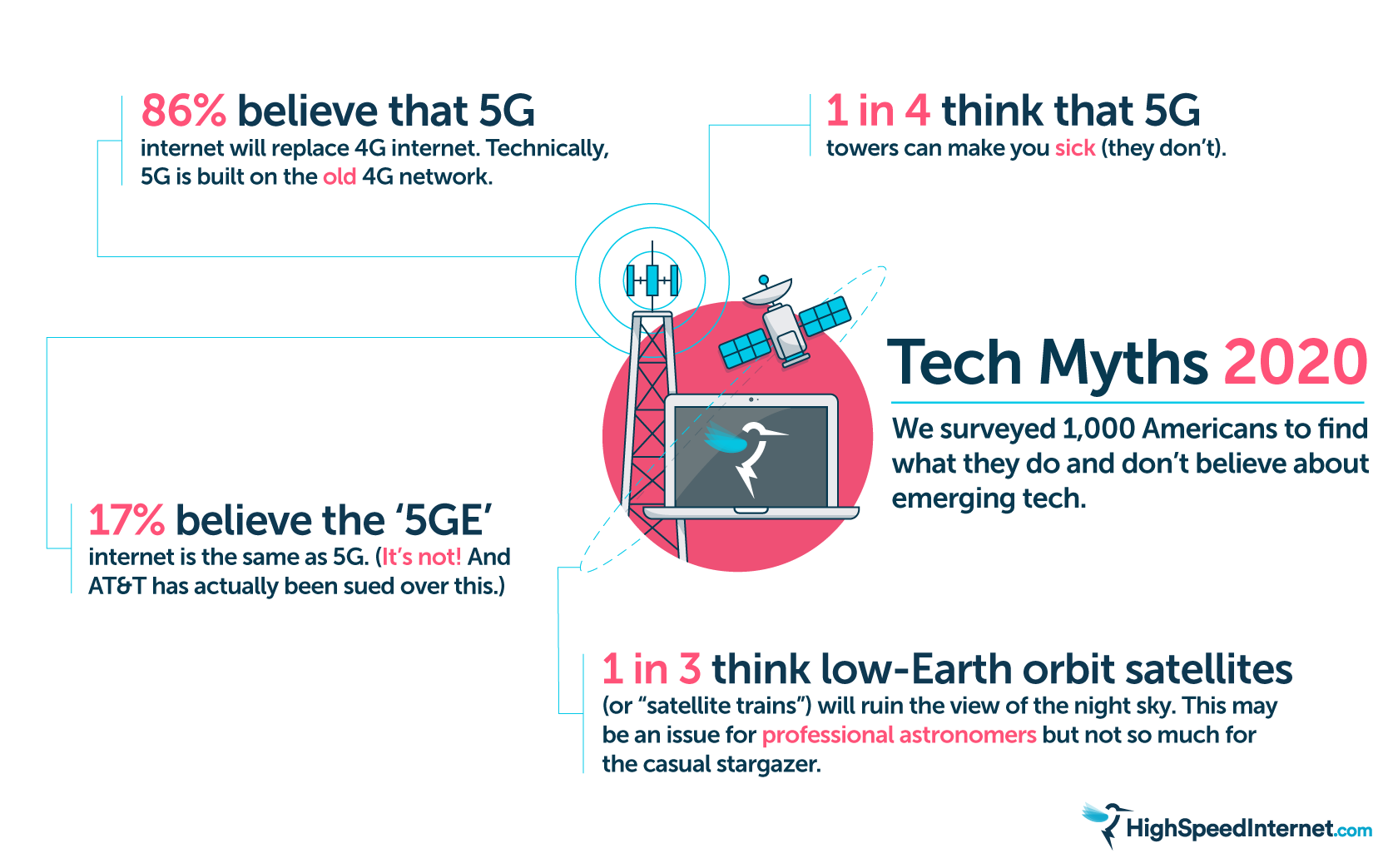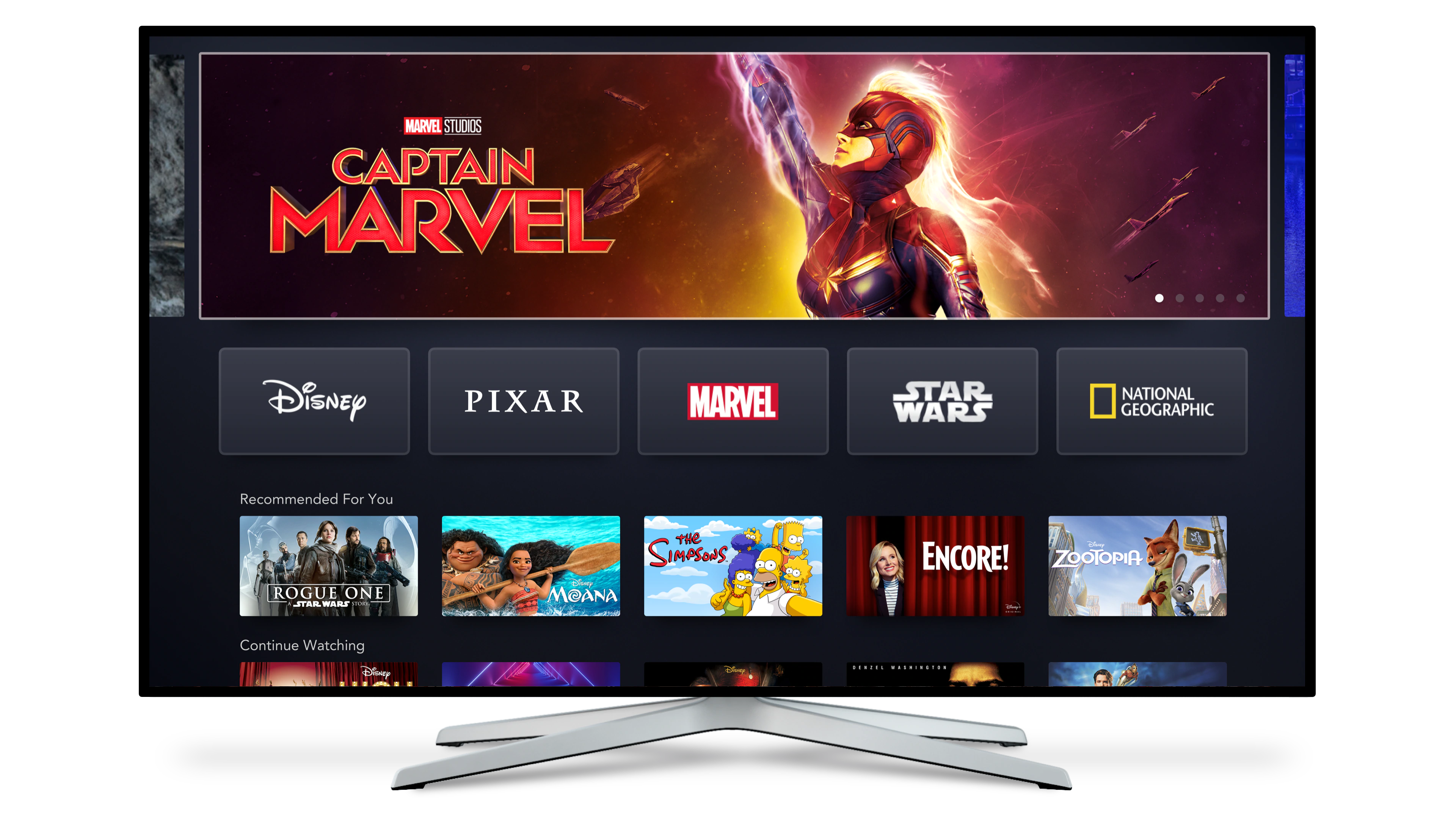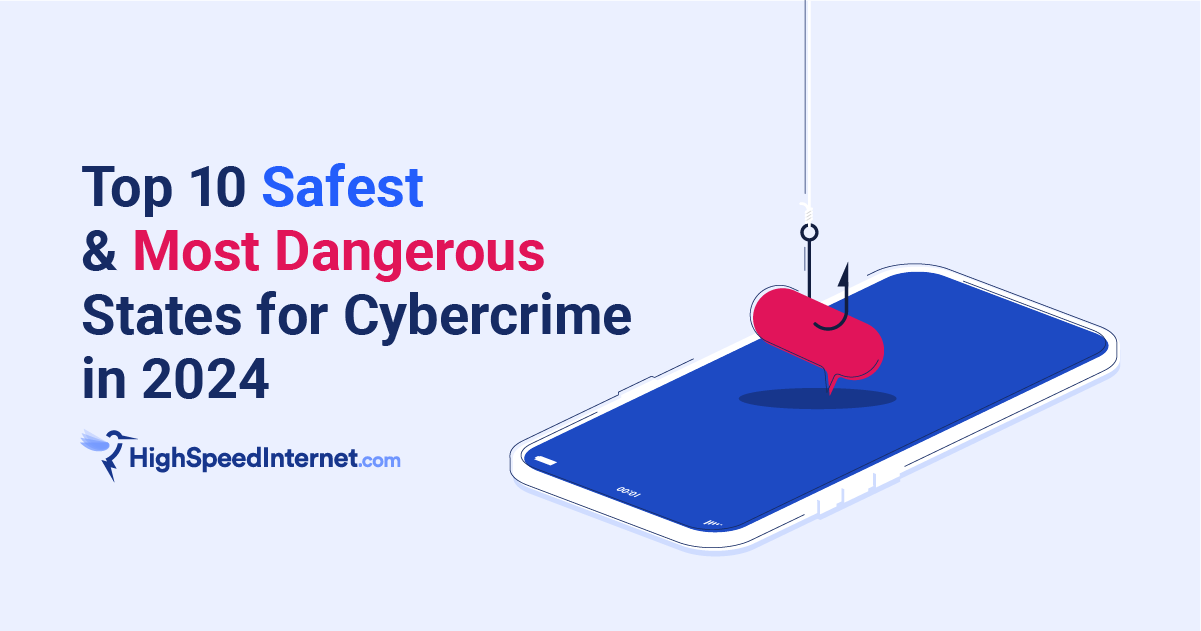Popular Tech Myths Americans Believe in 2020
Sep 14, 2020 | Share
Industry Exclusive/Entertainment
Technology changes so fast—it’s hard to keep up with the facts. Rumors spread quickly, misinformation turns to myth, and even after science has debunked specific claims, they persist as part of our culture.
We surveyed 1,000 Americans to find out what they believed about today’s latest technologies, including 5G cellular networks and low-Earth orbit satellites from Space X’s Starlink network. Then we set the record straight with some context along with expert insight to get everyone on the same page.

25% believe 5G internet towers can make you sick. (They don’t.)
Although many folks fear an increase in radiation with the advent of 5G cellular networks, the fact is 5G is not much different for users than the other cellular technologies we’re used to (other than it’s faster).
Experts have pointed to misleading information and graphs around the misperceptions about 5G’s safety.1 The conspiracy fears surrounding 5G, in part, come from a lack of personal agency in choosing these new mass technologies.2 Many people aren’t aware of the varying types of radiation technologies we already use in our daily lives or how focused 5G signals are.
“5G is a non-ionizing RF radiation, which is not strong enough to make humans sick. Additionally, 5G uses beam-forming technology to emit signals exactly where they are needed. So, 5G towers with their weak non-ionizing radiations are not the same as ionizing radiation from nuclear energy that can cause burns and severe genetic damage.”
—Pratik Jain, Author at 5Gversus4G.com
While others still have doubts about 5G’s safety,3 the general consensus is that 5G is safe.4
17% believe that “5GE” internet is 5G. (It’s not 5G; it’s the technology leading up to it.)
AT&T customers felt misled after AT&T displayed 5GE (5G Evolution) icons on phones, leading people to believe they were either getting access to 5G service or eventually getting kicked off their previous 4G networks. The National Advertising Review Board told AT&T to quit using 5G Evolution in its marketing, but the little icon that displays on your phone may still carry the 5GE branding.5
“5GE or 5G Evolution is the latest name for AT&T’s internet technology, which is carrying the latest LTE iteration. In summary, the difference between 5G and 5G Evolution is the same as 4G and 4G LTE Advanced.”
—Talha Waseem, Content Editor at InvoZone
In other words, think of 5GE as a stage of improvement that led to 5G.
In August of 2020, the FCC auctioned off $4.5 billion worth of 5G spectrum in the midband frequencies.6 At this point, all the major networks have launched their 5G services with varying coverage and results. AT&T and T-Mobile have better coverage nationwide, but slower speeds than Sprint. But, along with other expansion efforts, we can expect most of America to have 5G coverage and better speeds in the coming years.
86% believe that 5G internet will replace 4G internet. (Not true—5G is built on the 4G network.)
Don’t worry. You don’t need to upgrade your 3G or 4G phones when 5G becomes the norm. The 5G network is a different technology added on top of the 4G network, so if your phone works on the current 4G network, it will work after the 5G upgrade is rolled out.
If you want full 5G speed, you will need a 5G phone, but some of the network upgrades will also help 4G speeds.
The most available forms of 5G rely on the older 4G network, but the major networks operate on three different frequencies of 5G coverage.7 These different bandwidths don’t have the same footprint, so your individual results for 5G speeds and reliability will vary based on carrier and coverage in your area.
33% believe low-Earth orbit satellites (like Starlink) will ruin the view of the night sky. (It’s complicated.)
With the launch of hundreds of satellites, Space X’s Starlink internet is causing some to question if we’ll be able to see the stars at night with so many bright objects floating around. These satellites will not dramatically alter the view of the night sky for amateur stargazers, but it’s complicated when it comes to astronomers and scientists.
We received some feedback from astronomers that SpaceX satellites may be a big issue for astronomers. Starlink says they are trying to avoid this by covering satellites in a non-reflective substance,8 changing solar panel angles,9 and covering satellites with sunshades. But scientists aren’t convinced those measures are enough.
From Michael F. Lembeck, Ph.D., Clinical Associate Professor, Dept of Aerospace Engineering, University of Illinois at Urbana-Champaign, says:
“The satellites are creating havoc for astronomers and the non-reflective coatings SpaceX put on their newest satellites is not working. Currently there are only 775 Starlink satellites in orbit and 12,000(!) are planned for deployment. Light pollution from the ground will be no match for the disruptions caused by Starlink and several more planned constellations of several thousand satellites (OneWeb (650), Kuiper (3,236)).”
We can expect to see more human-made objects in the sky in the coming years, but technologists will continue to work to sync up the needs of both consumers and science.
Myths, mistakes, and moving on
“The main reason people believe tech myths is simple—it is because these myths are circulating like viruses on the internet. Advertisements often pop up with data that is unreal, yet people fall for the clickbait—and ultimately end up believing the myths that they are told.”
—Joe Flanagan, Lead App Developer at GetSongBPM
Tech myths are practically unavoidable cultural beliefs that can carry a lot of weight both in practical and emotional terms. Still, when we get enough science to clear things up, we can all keep moving forward and using technology to make our lives easier.
If you need help dispelling tech myths, feel free to share this article on Facebook!
Methodology
HighSpeedInternet.com conducted an anonymous survey of 1,000 Americans on how they feel about emerging internet trends and technology myths. Using the responses from our survey, we’ve highlighted the most common answers in this report.
Sources
- William J. Broad, The New York Times, “The 5G Health Hazard That Isn’t,” July 16, 2019. Accessed September 1, 2020.
- Kaitlyn Tiffany, The Atlantic, “The Great 5G Conspiracy” May 13, 2020. Accessed September 1, 2020.
- Joel M. Moskowitz, Scientific American, “We Have No Reason to Believe 5G Is Safe,” October 17, 2019. Accessed September 1, 2020.
- United States Food and Drug Administration, “Scientific Evidence for Cell Phone Safety,” Accessed September 10, 2020.
- Nat Ives, The Wall Street Journal, “AT&T Told to Stop Using ‘5G Evolution’ in Marketing,” May 20, 2020. Accessed September 1, 2020.
- Corinne Reichert, CNET, “Verizon’s LTE Rivals 5G Speeds on AT&T and T-Mobile, Analyst Says,” September 8, 2020. Accessed September 10, 2020.
- Rob Pegoraro, USA Today, “Thinking of Buying a 5G Smartphone? Finding Your Carrier’s Flavor of 5G Requires a Taste for Investigation,” August 5, 2020. Accessed September 1, 2020.
- Donna Fuscaldo, Interesting Engineering, “SpaceX to Coat Satellite with Non-Reflective Substance to Dull Brightness,” January 2, 2020. Accessed September 10, 2020.
- DL Cade, PetaPixel, “ SpaceX Unveils Plan to Keep Starlink Satellites from Ruining the Night Sky” April 24, 2020. Accessed September 10, 2020.
Author -
Trevor's written professionally for five years for editorial publications and retail/e-commerce sites. He lives in Salt Lake City and enjoys photography and making music in his spare time, or you can catch him on your local dance floor bustin' a move.
Editor - Cara Haynes
Cara Haynes has been editing and writing in the digital space for seven years, and she's edited all things internet for HighSpeedInternet.com for five years. She graduated with a BA in English and a minor in editing from Brigham Young University. When she's not editing, she makes tech accessible through her freelance writing for brands like Pluralsight. She believes no one should feel lost in internet land and that a good internet connection significantly extends your life span.




